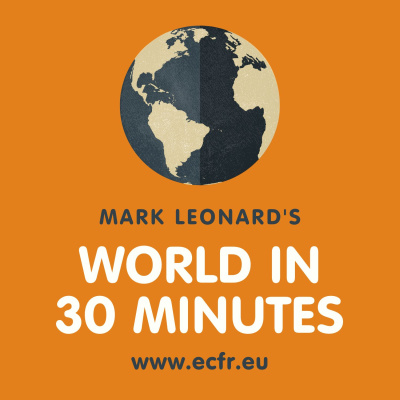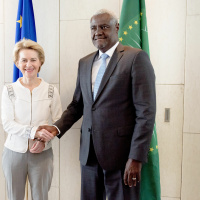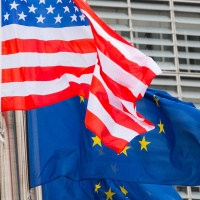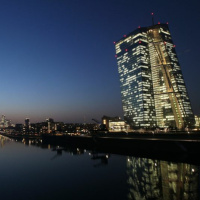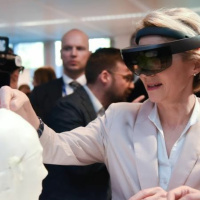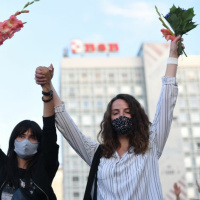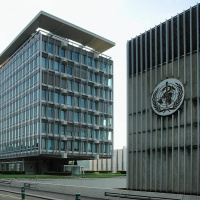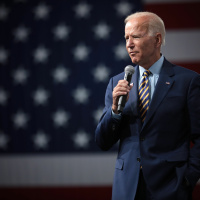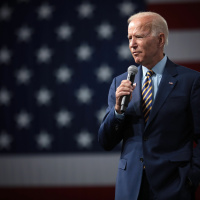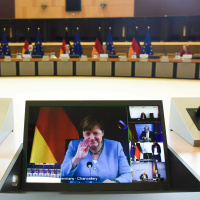Synopsis
Foreign policy podcasts hosted by Mark Leonard, Director of the European Council on Foreign Relations (ECFR), the first pan-European think-tank.
Episodes
-
Europe's pivot to Africa
20/11/2020 Duration: 27minAlmost a year ago, when EU Commission President Ursula von der Leyen made her first business trip outside the EU, she chose the African Union headquarters in Addis Ababa as her destination and took quite a stand . Also this year was supposed to be a “decisive year” in African-European relations: The German Minister for Economic Cooperation and Development talked at the beginning of 2020 about a “treaty of the century” which should have been sealed at the AU-EU Summit. However, with the pandemic ongoing, the Summit was postponed, and priorities shifted. Where do we stand now in building a “strategic partnership” between the European and African continent? And can we actually consider it a “strategic” one? What impact has the competition between the US and China on these relations?In this week’s episode, host Mark Leonard is joined by Faten Aggad, Senior Advisor to the AU High Representative on AU-EU negotiations, Mark Malloch Brown, former deputy secretary‐general of the UN under Kofi Annan and minister of sta
-
Europe’s new transatlantic bargain for Biden’s America
13/11/2020 Duration: 27minJoe Biden has won the US elections and in January 2021 will become the 46th president of the United States of America. While that is not yet official, it is clear. But what is also clear is that we cannot go back to the pre-Trump world. When Biden returns to the White House, he will look for a Europe that brings solutions rather than problems. Europeans should show they can be an equal partner and offer him a new transatlantic bargain. This week, host Mark Leonard is joined by our ECFR program directors: Susi Dennison, Janka Oertel, Julien Barnes-Dacey, Nicu Popescu, and Theodore Murphy to analyse how a “European offer” could look, with topics ranging from climate to trade, to multilateralism. Further reading: - ECFR topic page: https://ecfr.eu/topic/us-election-2020/ - “The best defence: Why the EU should forge security compacts with its eastern neighbours” by Gustav Gressel & Nicu Popescu: https://buff.ly/3jTzMMv This podcast was recorded on 12 November 2020.Bookshelf:• "Africa first" by Jakkie Cillier
-
Anxious allies: European sovereignty after the US election
05/11/2020 Duration: 27minWith Trump´s inauguration in 2017 and his claims about NATO and the transatlantic relationship, Europe began to realize that it needed to take better care of its own security. With the official election result looming, host Mark Leonard talks to ECFR’s heads of offices from Berlin, Paris, Madrid, and Warsaw – Jana Puglierin, Tara Varma, Jose Ignacio Torreblanca and Piotr Buras – as well as Jeremy Shapiro, ECFR´s research director and in-house US expert: How much impact does the future US president have on the very concept of European sovereignty? Will the idea and initiatives to build more strategic autonomy in Europe be put back to bed with Joe Biden in the White House? Or does Europe have to forge its own agenda?Further reading:• Topic page US elections and their impact on Europe and the world: https://buff.ly/3jQeFdV • “Independence play: Europe’s pursuit of strategic autonomy” by Ulrike Franke & Tara Varma: https://buff.ly/3jXaCwJ • "An American chasm" The Rachman Review with Jeremy Shapiro: https
-
Europe’s role in America’s election
30/10/2020 Duration: 22minHow will and can Europeans react in the event of a post-election chaos in the US? The election day is fast approaching yet the outcome still remains highly debatable and unpredictable. And, it is rather likely that also after November 3rd, no clear winner can be announced. How should Europe respond in this time of uncertainty? What impact will the prolonged power struggle have on the transatlantic relationship? ECFR’s research director Jeremy Shapiro takes over this week and is joined by ECFR´s senior director for strategic partnerships Anna Kuchenbecker, the Polish MEP Radek Sikorski, ECFR´s deputy director Vessela Tcherneva and Pierre Vimont, French ambassador to the US.Further reading: The world must prepare for a contested US election, by Timothy Garton Ash: https://buff.ly/3jKwPOe This podcast was recorded on 23 October 2020.Bookshelf:• “Cynical Theories: How activist scholarship made everything about race, gender, and identity—and why this harms everybody” by Helen Pluckrose & James Lindsay • “The
-
How can the EU strike back? The way towards higher economic resilience
23/10/2020 Duration: 32minEuropean countries are increasingly coming under threat of economic coercion from great powers, as outlined in the latest ECFR’s policy brief. But what do we mean by economic coercion? What and who is currently threatening EU’s sovereignty, and what is likely to threaten it in the future?In this week’s episode, host Mark Leonard is joined by Elizabeth Rosenberg, Senior Fellow and Director of the Energy, Economics, and Security Program at the Center for a New American Security, Jean Pisani-Ferry, ECFR Council Member and a senior fellow at Brussels-based think-tank Bruegel and Jonathan Hackenbroich, ECFR policy fellow for economic statecraft and the head of ECFR’s Task Force for Protecting Europe from Economic Coercion to discuss how Europe could build up higher economic resilience. How can the Union best redress market distortions caused by sanctions, export controls and other forms of economic coercion? And can deterrence actually work?Further readings:• "A New Arsenal for Competition: Coercive Economic Meas
-
Conquering the cyber sphere: How the EU can build digital sovereignty
16/10/2020 Duration: 24minEurope’s digital transformation and sovereignty has become a question of existential importance. But what does it actually mean to be digital sovereign? Host Mark Leonard is joined by Marietje Schaake, President of the CyberPeace Institute and International Policy Director at the Cyber Policy Center at Stanford University as well as ECFR’s Jose Ignacio Torreblanca and Jeremy Shapiro. Together they analyse where we do see progress in developing digital sovereignty on EU level and where challenges still remain. What are some of the ideas for how the EU could develop digital sovereignty? And why does Europe have to even take two steps ahead and go above and beyond being a “regulatory superpower”? Further read: - “Europe’s digital sovereignty: From rulemaker to superpower in the age of US-China rivalry” by Carla Hobbs (ed.) https://buff.ly/30eSI1P - “Weakened democracy is another harm caused by Big Tech” by Marietje Schaake in Financial Times https://buff.ly/2T23y6I This podcast was recorded on 15 October 202
-
Why Europe cannot become a giant Switzerland - geopolitical challenges in times of covid-19
09/10/2020 Duration: 30minThe covid-19 pandemic has shaken the EU’s conception of order and exposed a gap between European aspirations and actions. Firstly, Europeans are confronted with the fact that raw power, not rules, is the main factor determining today’s global dynamics. Secondly, global politics are now centred rather in Asia than Europe; the Sino-American rivalry has shifted attention away from European issues.In this week’s podcast, Mark Leonard stars as guest – not host – to discuss with policy fellow Ulrike Franke und head of ECFR’s Berlin office Jana Puglierin these “twin shocks”. What are possible ways to deal with these new geopolitical realities shock and what does this mean for the transatlantic relationship? To what extent will the US elections be a game-changer? Should Europe reinvent its geopolitical approach? And in which ways can Germany help Europe to redefine its strategy in this deeply changed scenario?Further reading: “Geopolitical Europe in times of covid-19 ” by Mark Leonard: https://www.europesfutures.eu/v
-
Nagorno-Karabakh: Armenia and Azerbaijan's thawing of the ‘frozen conflict'
02/10/2020 Duration: 31minThe contested Nagorno-Karabakh region is at the heart of a decades-long armed standoff between neighbours Armenia and Azerbaijan. The heavy clashes seen last week prompted fears that the dispute could spark yet again another war in the region. Host Mark Leonard is joined by Nicu Popescu, head of ECFR’s Wider Europe programme, ECFR’s Turkey expert Asli Aydıntaşbaş and Sophia Pugsley, Caucasus Regional Manager at International Alert. They explain the background to this conflict, why it flared up again and talk about the situation on the ground. What kind of roles do Turkey and Russia play in the recent fights? Should the EU interfere, and if yes, how? Further reading: "A hill here, a village there: Nagorno-Karabakh and the salami-slicing wars", by Nicu Popescu: https://buff.ly/3joH77wThis podcast was recorded on 30 September 2020.Bookshelf: “The story of a new name” by Elena Ferrante - “Envisioning peace: An analysis of grassroots views on the Nagorny Karabakh conflict” by Larisa Sotieva et al. - “Parts of a Ci
-
Rifts under sea and on land: The multiple crises in the Eastern Mediterranean
25/09/2020 Duration: 32minIn the eastern Mediterranean, a scramble is under way between countries in the region for access to recently discovered gas fields, often overlapping with wider battle lines across the Middle East, historical tensions and far-back-reaching sentiments. Following up on last week’s conversation with spokesperson and close senior advisor to President Erdogan Ibrahim Kalin, this week’s episode analyses the crisis from a Greek, French, and Turkish perspective. Host Mark Leonard is joined by ECFR´s Turkey expert Asli Aydıntaşbaş, the head of ECFR’s Paris Office Tara Varma and ECFR Council Member, professor at the University of Athens and President of the Hellenic Foundation for European and Foreign Policy (ELIAMEP) Loukas Tsoukalis. Together, they discuss what led to the escalation and which different aspects are important to understand the crisis. Is Ankara adopting an assertive approach or is it playing a “stabilising role”? And what are the intentions behind President Macron´s call for a Pax Mediterranea? Can Eu
-
From fragility to vitality – Analysing von der Leyen’s #SOTEU
17/09/2020 Duration: 33minUrsula von der Leyen’s first State of the European Union speech was as long as it was broad in topics and calls for action. Host Mark Leonard is joined by Alexander Stubb, ECFR Board Member, Director of the European University Institute’s School of Transnational Governance and Former Prime Minister of Finland and Carlos Moedas Trustee at the Calouste Gulbenkian Foundation and former European Commissioner for Research, Science and Innovation. Together they break down the speech and analyse its various parts, from climate to health policy, from digital sovereignty to Europe’s place in the world. What did the Commission President promise and envision? And did she point out some black sheep?This podcast was recorded on 16 September 2020.Bookshelf:• “Governance in the new global disorder: Politics for a post-sovereign society” by Daniel Innerarity • “The virus in the age of madness" by Bernard-Henri Lévy • “Has China won? The Chinese challenge to American primacy” by Kishore Mahbubani • "Negotiating flexibility
-
Trump’s dirty tricks
11/09/2020 Duration: 32minAlthough US President Donald Trump’s efforts to undermine the election are shameless, they are still more subtle than the outright election rigging that one finds in places like Belarus. Like other authoritarian leaders, Trump is deploying a new anti-democratic politics that has yet to be fully comprehended. Together with Asli Aydintasbas, Jeremy Shapiro and Andrew Wilson, Mark Leonard depicts seven dirty tricks that Trump seems to be borrowing from e.g. Russian President Vladimir Putin or Turkish President Recep Tayyip Erdogan.Further reading: "Trump's dirty trick" by Mark Leonard: https://buff.ly/2EYW4xG This podcast was recorded on 9 September 2020.Bookshelf:- “Circe” and “The song of Achilles” by Madeline Miller - “The eternal city: A history of Rome” by Ferdinand Addis - “Democracy for sale” by Peter GeogheganPicture (c) Gage Skidmore Hosted on Acast. See acast.com/privacy for more information.
-
Surveillance and the inevitable AI future
04/09/2020 Duration: 37minIn this week’s episode, we feature one of the focus sessions from our Annual Council Meeting this June. Policy Fellow Ulrike Franke moderated this online panel discussion featuring Marietje Schaake, International Director of Policy at Stanford University's Cyber Policy Centre and former Member of the European Parliament, and Carlos Moedas Trustee at the Calouste Gulbenkian Foundation and former European Commissioner for Research, Science and Innovation, European Commission. Is the European Union indeed a “regulatory superpower” for digitalisation and the tech market? Does the EU draw on its AI potential to the fullest? Where should Europe position itself in the US-China rivalry? The session was recorded on 29 June 2020.Further reading: -Europe’s digital sovereignty: From rulemaker to superpower in the age of US-China rivalry by Carla Hobbs (ed.): https://buff.ly/30eSI1P-Not smart enough: The poverty of European military thinking on artificial intelligence by Ulrike Franke: https://buff.ly/2Es0QApBookshelf:ECF
-
Protest movement in Belarus: Will Lukashenko survive the current state (of) crisis?
28/08/2020 Duration: 30minIn this week’s episode, Jeremy Shapiro stepped in as host and welcomes senior policy fellows Kadri Liik and Andrew Wilson as well as political scientist and editor of “Belarus-Analysen” Olga Dryndova to the podcast. Together, they shed light on the situation on the ground in Belarus: what are the goals do of the opposition in Belarus and what kind, if any, of strategy does it have for achieving them? How does long-time president Lukashenko see the situation and what is the state’s strategy to try to remain in power? And finally, what roles should the EU and Russia play in a mediation process?Further reading: Why the EU now needs a deliberate Belarus policy, by Andrew Wilson: https://buff.ly/3gomwOl This podcast was recorded on 26 August 2020.Bookshelf:- “Berlin 1936: 16 days in August” by Oliver Hilmes - Follow Tadeusz Giczan for analyses on Belarus - “Lie Machines: How to save democracy from troll armies, deceitful robots, junk news operations, and political operatives” by Philip N. Howard- Collections of
-
If you stay ready, you don’t have to get ready: Rethinking global health security
21/08/2020 Duration: 27min“Defending the WHO is necessary but not sufficient to address the weaknesses that the corvid-19 crisis has revealed. Fundamentally, those weaknesses revolve around the interplay between, first, underfunded national and local health systems and second, international coordination which relies on goodwill and is too weak in a world of great power rivalry,” write Jonas Gahr Store, Leader of the Norwegian Labour Party and former Health and Foreign Minister as well as David Miliband, CEO of the International Rescue Committee and former UK Foreign Secretary in their recent op-ed. Mark Leonard invited the two author to his podcast talking about how the global health system could be reformed: what role should Europe play? And is it likely that the US position to global health changes with a potential Biden win? And can China also to play a positive role in global health security?Further reading: “Global Health Security Needs New Thinking” by David Miliband and Jonas Gahr: https://www.newsweek.com/new-world-health-mech
-
Where there's a will, there's a way: France, Germany and EU coalition building
14/08/2020 Duration: 27minIn this week’s episode, Mark Leonard presents the new and third edition of ECFR´s Coalition explorer, which also included special questions regarding the impact of the COVID-19 crisis. Together with policy fellows Ulrike Franke and Pawel Zerka, he analyses the collected data in depth, answering the question of France’s and Germany´s role within the EU: How are the two countries perceived by their European partners? How can this power tandem influence EU policy-making? And what kind of new coalition patterns did emerge during the covid-19 crisis?EU Coalition Explorer: https://www.ecfr.eu/eucoalitionexplorer The big engine that might: How France and Germany can build a geopolitical Europe by Ulrike Franke and Jana Puglierin https://www.ecfr.eu/publications/summary/the_big_engine_that_might_how_france_and_germany_can_build_a_geopolitical_e The EU Coalition Explorer was developed within ECFR’s Rethink: Europe” project supported by Stiftung Mercator.This podcast was recorded on 31 July 2020.Bookshelf:•“In the Sha
-
The Biden effect and the future of US-Europe relations | Part II
07/08/2020 Duration: 35minAfter last week’s discussion with Matt Duss and Jeremy Shapiro, Mark Leonard follows up by gathering the European views on a possible Biden win and its effect on US foreign policy. Vessela Tcherneva, deputy director of ECFR and head of our Sofia office, Jana Puglierin, head of ECFRs Berlin office, Tara Varma, head of ECFRs Paris office and Jeremy Shapiro, ECFR´s research director and in-house US expert analyse what a potential Biden administration would mean for European sovereignty and EU foreign policies. How do expectations differ in France, Germany and Central and Eastern Europe? What would another Trump or Biden administration mean for European security? And could Biden also restore the public image of the US which has worsened during the coronavirus crisis significantly in Europe? This podcast was recorded on 29 July 2020.Bookshelf:-" Falken im Sturm“ by Constanze Stelzenmüller in Internationale Politik - "Counterpart“ -“Twilight of Democracy: The seductive lure of authoritarianism” by Anne Applebaum -
-
The Biden effect and the future of US-Europe relations | Part I
31/07/2020 Duration: 27minThe United States presidential election is approaching and there is no doubt that its result will have a significant and large-scale impact on global politics. Across the Atlantic, European analysts already started to discuss the possible outcomes and what they would mean for Europe and the transatlantic partnership. What changes would a Biden win bring? How could US foreign policy look like under him as President? How would it affect the US-Europe relations? In this week’s podcast, Mark Leonard is joined by Matt Duss, foreign policy advisor to the Bernie Sanders 2020 presidential campaign and Jeremy Shapiro, ECFR´s research director and in-house US expert to discuss what Biden will bring to the table. This podcast was recorded on 29 July 2020Bookshelf: - “Blowback” by Brendan James and Noah Kulwin - “Miles: The Autobiography” by Miles Davis with Quincy Troupe - “Circe” by Madeline Miller - “Why We're Polarized” by Ezra Klein Hosted on Acast. See acast.com/privacy for more information.
-
The EU’s budget and recovery fund deal – a historic moment for Europe?
24/07/2020 Duration: 27minThe over 90-hour European Council summit in Brussels ended with a deal on a €1.82 trillion financial package. What does this deal mean for the future of Europe? Will the EU recovery fund, made up of €390 billion in grants and €360 billion in loans, be a historic change of our Europe and the eurozone, as Macron said? In this week’s podcast, Mark Leonard is joined by Guntram Wolff, Director of Bruegel, Piotr Buras, head of ECFR's Warsaw office and José Ignacio Torreblanca, head of ECFR's Madrid office to discuss the EU deal on the bloc's budget and economic recovery fund. This podcast was recorded on 22 July 2020 Bookshelf: The Balkans: Nationalism, War and the Great Powers 1804 – 1999 by Misha Glenny https://www.penguinrandomhouse.com/books/311471/the-balkans-by-misha-glenny/ How to Lose a Country: The 7 Steps from Democracy to Dictatorship by Ece Temelkuran http://www.4thestate.co.uk/2018/11/cover-reveal-how-to-lose-a-country-by-ece-temelkuran/ AI Superpowers: China, Silicon Valley, and th
-
It’s complicated: Europe-China relations in a world of superpower competition
17/07/2020 Duration: 31minCan Europe compete in today’s new geopolitical realities? Does the Union find itself in a technology war with China? And are at least cooperative solutions with China on climate policies possible? In this week’s podcast, Mark Leonard is joined by Agatha Kratz, Associate Director at Rhodium Group and expert on EU-China relations, Janka Oertel head of ECFR´s Asia programme as well as ECFR co-chair Carl Bildt, former Prime Minister and Foreign Minister of Sweden. Together, they answer these questions and discuss if and how Germany – as current EU Council Presidency holder – can find ways to recalibrate the EU’s handling and approach to China. A Europe Ready to Compete? EU-China relations and new geopolitical realities: https://youtu.be/DaoiVm9zHzE “Europe, China, and Hong Kong: Why new red lines will be worth the cost” by Janka Oertel https://www.ecfr.eu/article/commentary_europe_china_and_hong_kong_why_new_red_lines_will_be_worth_the_c “Booster or Brake? COVID and the Belt and Road Initiative” by Agatha Kratz
-
Solidarity and sovereignty: a “mission possible” for Germany’s EU Council Presidency?
10/07/2020 Duration: 25minIn his opening remarks at our virtual Annual Council Meeting, German Foreign Minister Heiko Maas, spoke about Germany’s Presidency of the Council of the EU and the high expectations which are placed on it. According to him, the next six months will be centred around two things: solidarity and sovereignty.In this week’s podcast, Mark Leonard is joined by our expert Jana Puglierin, head of the Berlin office to discuss the German EU Presidency in detail. What are the biggest challenges? Can Germany deliver on a greener, more social, and innovative recovery plan for the EU? Or are the expectations so high that they are set to fail?Watch the opening session of our Annual Council Meeting on Germany in Europe and the German EU Council Presidency here: https://youtu.be/r9FxIX6WapQRemarks from Heiko Maas, Foreign Minister of Germany, at ECFR's virtual Annual Council Meeting 2020: https://www.ecfr.eu/article/remarks_from_heiko_maas_foreign_minister_of_germany_at_ecfr_annual_councilThis podcast was recorded on 3 July 20
